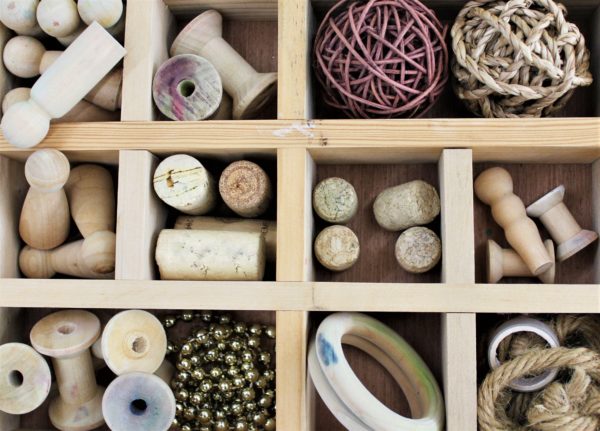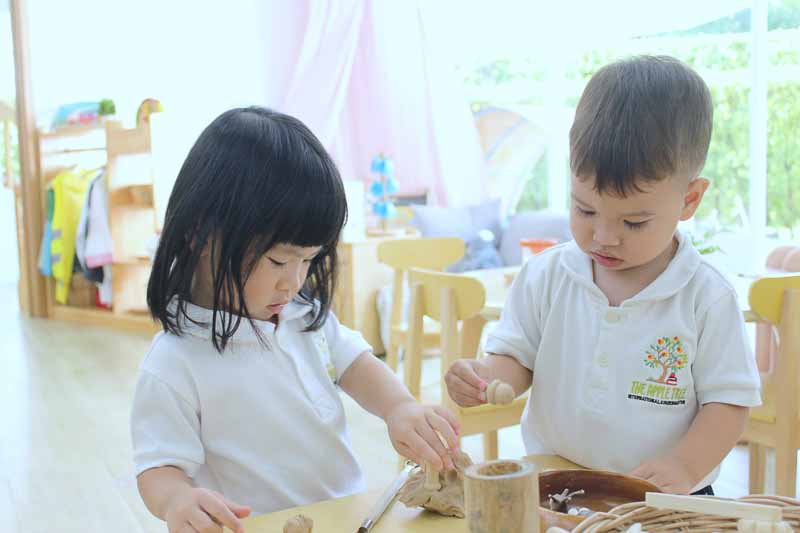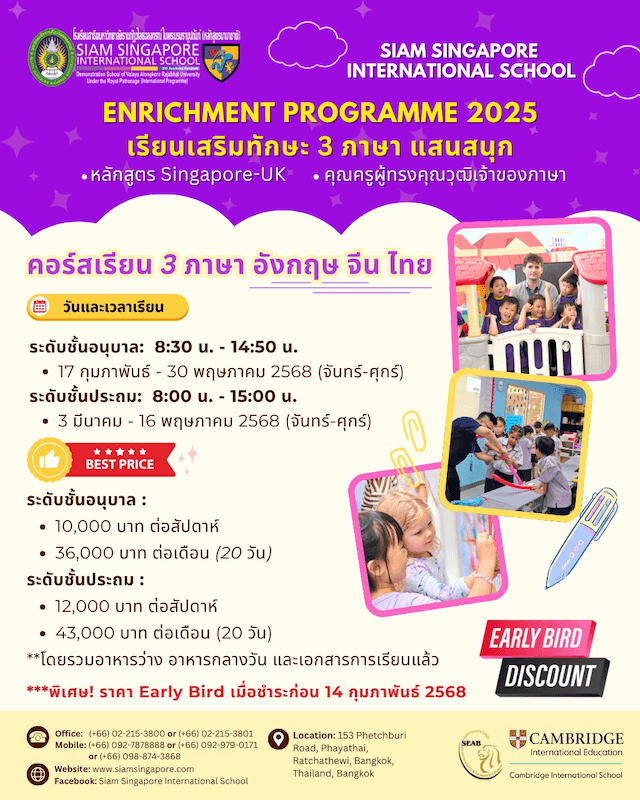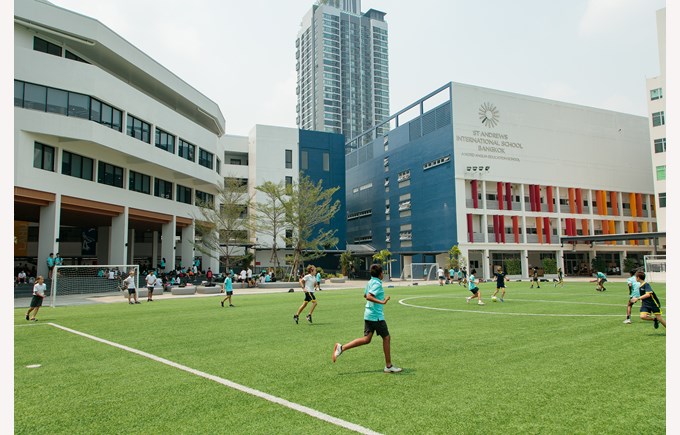You may be interested to learn that high-quality kindergartens provide opportunities for children to expand their imagination, boost their creativity, satisfy their curiosity, and fulfill their desires through quality loose parts play. It is an approach to early childhood education which The Apple Tree International Kindergarten actively promotes at our purpose-built campus on Sukhumvit 26, to foster a lifelong love of learning. Our qualified, native English teachers are trained in using the British EYFS curriculum to support children in their play choices, while ensuring they reap the maximum educational benefits and have fun!
So exactly what is loose parts play and how can Early Learners benefit from this curious approach to learning?
Beyond fancy and expensive toys designed for specific purposes or functions, there are a whole lot of materials, easily obtained at little or no cost, that can widen the scope, as well as greatly enhance the quality, of children’s play (and learning) experiences; these are collectively called ‘loose parts’.
In other words, loose parts are materials that can be moved, combined, taken apart, redesigned, and used in more ways during play than one can imagine.
They can be natural (rocks, sticks, sand, shells, seeds, pebbles, feathers, water, leaves, flowers, grasses, bark), or man-made (straws, ropes, ribbons, chalk, wine corks, bubble wraps, crates, cartons, tires and boxes).
Because loose parts play is open-ended and child-led as opposed to adult-led, it offers so many more possibilities and children tend to get highly involved in it.
There are so many benefits children can derive from engaging in this sort of play, that we cannot possibly discuss them all in this brief piece; so, the following are ten benefits we consider most significant.

1. Imagination and Creativity Boost
Since loose parts do not have a clearly defined purpose, and no one tells children what they are supposed to do with themwhen it’s play time, they are compelled to use their imagination, to see possibilities in these objects or materials, and to come up with creative ways to make the most use of them.
With the freedom to think and explore their own ideas when faced with loose parts, a child’s imagination is enhanced, and they become more creative as they try to find ways of using the same loose parts for many different purposes during play.
2. Greater Independence
Loose parts play helps to foster independence because it is child-led for the most part. With minimal input from parents, educators or caregivers, a child engaged in loose parts play has no choice but to think for themselves, set their own agenda, as well as define their own methods and objectives.
Faced with some sticks, stones and sand for instance, your child would have to decide what to build and how to go about building it – all by themselves. Having to constantly make such decisions and carry them out, then, helps to make your child more independent.
3. Better Problem Solving
Due to its open-ended nature, loose parts play tends to present many obstacles or challenges which a child has to overcome in order to achieve their play objectives.
For example, while engaged in loose parts play children usually have to devise ways of using the materials available – whether adequate or not – to achieve particular outcomes; they have to determine what objects are suitable for symbolising some other objects; they also have to think of ways to prevent things from being too short, long, heavy, or unbalanced while designing structures for instance. Overcoming all these challenges sharpens their problem-solving skills.
4. Improved Concentration
Loose parts play can be very immersive because of the nearly unlimited possibilities for investigation and exploration that it offers children. If you observe your child while they are practicing this kind of play you will notice that they exhibit a higher level of involvement than when they are taking part in activities led/directed by adults.
Since loose parts play keeps a child engrossed, it helps them to extend their ability to concentrate, which in turn helps the child to excel in other activities or in carrying out specifictasks.
5. Language and Vocabulary Development
When children engage in loose parts play together there tends to be a lot of questioning, narration, negotiation and exchange of ideas. Children like to tell playmates what they are doing, and also like to ask others what they are doing. Newly-learned language is explored, funny voices for different characters are used and phrases are even made up in order to better describe things or share ideas.
The rich interchange of language resulting from good quality loose parts play will go a long way towards developing your child’s vocabulary and improving their conversational skills.
6. Superior Emotional Development
While engaged in loose parts play children will usually take on varying roles at different points; using loose parts to represent their favourite characters, real or imagined, they will also act out a variety of dialogues and stories.
By doing this, children get to view the world through different perspectives; they gain a better understanding and appreciation of the world and other people; they grow in confidence and develop a greater sense of self and understanding of the things they enjoy doing, which contributes to their developing emotional maturity.
7. Feelings of Satisfaction
Because playing with loose parts frequently requires childrento think, solve problems, create and achieve, the end result for children is a feeling of excitement, accomplishment, and satisfaction.
Let’s say your child has spent quite a lot of time trying to build a tower with stones; and, despite the tower collapsing several times, they persisted and finally succeeded. Don’t you think they will get to experience the feelings of elation and fulfilment that accompany achievement? We most definitely think so.
8. Multiple Skills Acquisition
Due to its cross-curricular nature, loose parts play presents children with numerous opportunities to develop skills across several areas including science, maths, literacy, art and physical development, to mention but a few.
Your child could, for example, acquire creative/design skills by making pictures with loose parts such as leaves, or creating shapes and models with play dough; they could develop their communication skills through constant interaction with peers; and they could also develop their math skills by sorting, counting, and creating patterns using loose parts.
9. Improved Risk-Taking Ability
There is some level of positive risk-taking associated with different forms of loose parts play, such as building structures with sticks and then walking or climbing over them, using child-friendly hammers on peg boards or constructing ramps to experiment with how different objects travel along them. Children explore their abilities and limits through play when they take risks and they become more comfortable with taking and managing risks in general.
It has been found that exposing children to controlled risks positively impacts their psychological and emotional development, and also promotes their independence.
10. Enhanced Fine and Gross Motor Skills
Loose parts play is hands-on and physical. Children engaged in this kind of play will be sorting, transporting, constructingand manoeuvring a variety of objects. They will also be usingtheir fingers to manipulate smaller items like beads, leaves or rubber bands.
All these involve different physical movements which hone the development of important gross and fine motor skills in children.
Evidently, loose parts play can positively impact your child in many different ways.
Just bear in mind that while this type of play is mostly child-led, you, as a parent, have important and intentional roles to play, especially when your child engages in this kind of play at home.
You could help them source the loose parts they need, encourage them when they are facing obstacles, and applaud them when they achieve something; you could also supervise and provide a bit of guidance when/where necessary about different roles or key language to ensure they reap the benefits of loose parts play.
With thanks to The Apple Tree International Kindergarten
admissions@appletreekindergarten.com
Phone: 085-333-5558














